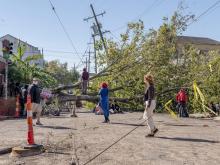- Charlotte-based marketing agency announces $20,000 Creative Campaign Grant to help communities after Hurricane Helene
- Artists transform hurricane aftermath into hoop-inspired masterpieces at Charlotte exhibit
- NC's cost for Hurricane Helene damage is nearly $60 billion, state says
- State to develop drone program to better respond to disasters like Helene, Florence
- South Carolina residents face deadline to get storm debris out to the curb after Hurricane Helene
NOAA: Average number of Atlantic hurricanes grows after record-breaking 2020 season

Although predictions for the 2021 Atlantic hurricane season are still a month away, NOAA’s Climate Prediction Center said the average number of storms has increased.
NOAA said Friday that the new 30-year average, spanning from 1991 to 2020, has increased to 14 named storms and seven hurricanes each year.
The previous period, based from 1981 to 2010, called for an average of 12 named storms, six hurricanes, and three major hurricanes.
According to NOAA, a new average is recorded every decade.
“This update allows our meteorologists to make forecasts for the hurricane season with the most relevant climate statistics taken into consideration,” said Michael Farrar, director of NOAA’s National Centers for Environmental Prediction.
The 2020 Atlantic hurricane season was the most active yet, with 29 named storms. The previous record of 28 storms was set in 2005, according to NOAA.
On Thursday, Colorado State University its 2021 Atlantic hurricane season forecast, predicting another above-average season this year.
CSU is calling for 17 named storms, 8 hurricanes and 4 major hurricanes (Category 3 or higher). Each of these numbers is above the typical average.
Sea surface temperatures are one cause of this, meteorologists said, and “there is considerable warmth across much of the eastern Atlantic where the ocean’s surface temperature is 1-3 degrees Celsius above normal for early April.”